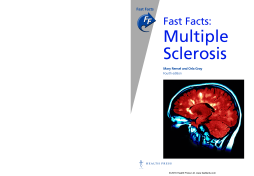
Additional Information
Book Details
Abstract
Since the last edition of this book, ’no evidence of disease activity’ (NEDA) has been proposed as a new treatment target, early data on the first pharmacological treatments for progressive MS have emerged, and the first remyelination trial has shown positive effects on nerve repair. It is with this sense of optimism that the authors of Fast Facts: Multiple Sclerosis have detailed the latest developments for use in clinical practice by all members of the multidisciplinary team, including:
- a concise overview of investigations and modern diagnostic criteria
- a holistic approach to all signs and symptoms, and proactive relapse management
- the latest disease-modifying drugs, including when to treat, choice of drug and risk versus benefit.
With case histories that will help to guide treatment decisions, discussion of the special considerations for MS during pregnancy, and in children and the elderly, and a detailed outline of emerging therapies, this book will benefit all healthcare professionals involved in the care of patients with this complex disease.
Table of Contents
| Section Title | Page | Action | Price |
|---|---|---|---|
| Fast Facts: Multiple Sclerosis, fourth edition | 1 | ||
| Contents | 4 | ||
| Title page | 2 | ||
| List of abbreviations | 5 | ||
| Introduction | 6 | ||
| CHAPTER 1: Epidemiology and genetics | 8 | ||
| CHAPTER 2: Pathology | 16 | ||
| CHAPTER 3: The clinical picture | 26 | ||
| CHAPTER 4: Treatment of relapses and symptoms | 60 | ||
| CHAPTER 5: Disease-modifying treatment | 80 | ||
| CHAPTER 6: Emerging therapies | 106 | ||
| CHAPTER 7: Special MS populations | 114 | ||
| CHAPTER 8: Lifestyle considerations and the multidisciplinary team | 126 | ||
| CHAPTER 9: Advanced multiple sclerosis | 135 | ||
| Useful resources | 141 | ||
| Index | 143 | ||
| Back cover | 146 |
